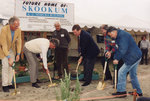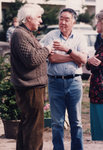Carl Nomura was a builder – a builder of effective people, effective organizations and buildings.
That talent helped him help many others get important things done in the Port Townsend area over …
This item is available in full to subscribers.
We have recently launched a new and improved website. To continue reading, you will need to either log into your subscriber account, or purchase a new subscription.
If you had an active account on our previous website, then you have an account here. Simply reset your password to regain access to your account.
If you did not have an account on our previous website, but are a current print subscriber, click here to set up your website account.
Otherwise, click here to view your options for subscribing.
* Having trouble? Call our circulation department at 360-385-2900, or email our support.
Please log in to continue |
|


Carl Nomura was a builder – a builder of effective people, effective organizations and buildings.
That talent helped him help many others get important things done in the Port Townsend area over the past 26 years, a record which made his passing at his Port Townsend home on July 25, at the age of 93, the end of an era.
He helped shape Skookum from a sheltered workshop for a handful of adults with developmental disabilities into a multi-faceted services company that today employs more than 1,000 people, most of them disabled. He literally helped build the first sanctuary for Port Townsend’s Quimper Unitarian Universalist Fellowship (QUUF) and its predecessor building. He took under his wing a dozen or more local entrepreneurs, young and old, female and male, to teach them the discipline and the tools needed to grow a successful business or nonprofit. He started the Japanese restaurant now called Ichikawa Japanese Cuisine. He tutored high school students. He gave money to dozens of causes and people in need.
“He lived his whole life with intention,” said Jim Westall, founder of Skookum and, for 15 years, recipient of almost daily mentoring by Nomura. “And he died with intention. It’s the way he lived his life.”
Nomura was recently diagnosed with esophageal cancer and chose to use Washington State’s death with dignity law, a decision he made known to family and close friends, giving them time to pay their respects. His chosen path was not a surprise to those who knew him; even in dying he was pragmatic, strategic, humorous, generous and a mentor to his community.
With his wife Louise, Nomura retired first to Seattle then to Port Townsend in the late 1980s, coming here at the behest of his daughter, Teri Nomura and her husband Michael Bowen, who were raising a family. Nomura’s personal, military and professional backgrounds were unique and remarkable and would find very fertile environment on Discovery Road in Port Townsend.
PHYSICIST & EXECUTIVE
He was born in a boxcar in Deer Lodge, Montana, in 1922. His father was a railroad laborer; his mother was a cook for railroad workers. During World War II, Nomura’s family was forced to leave their home for relocation in Manzanar, a Japanese-American internment camp in California; and then at camp Minidoka, Idaho, and late in the war, back to Manzanar. After the war he went to college near Chicago, then joined the U.S. Army.
After discharge, he enrolled at the University of Minnesota where he earned three degrees in physics, including a Ph.D. focused on solid state electronics. In 1988, the University of Minnesota Board of Regents granted Nomura the school’s Outstanding Achievement award, its highest recognition for an alumnus.
As a young and brilliant physicist, he went to work for the Honeywell Corporation, then busy moving the company from vacuum tubes to semi-conductors. Nomura helped develop the process for making crystals that worked as infrared sensors. But in this disciplined, driven man Honeywell executives thought they also recognized a corporate leader, and they promoted him out of the laboratory and into management. Nomura once recalled removing all of the books on physics from his shelves and replacing them with books on leadership, finance and corporate management. He was sent by Honeywell’s CEO to Harvard to complete an MBA.
He rose to take the lead of Honeywell’s semi-conductor business, with sales of a half-billion dollars, operations in seven countries and 7,000 employees under his direction. When he retired after 33 years, he was a corporate senior vice president and on the board of directors.
Said a CEO citation: “Dr. Nomura has made a greater contribution to the success of Honeywell than any other executive in the company.”
SKOOKUM, UNITARIANS
Settling into Port Townsend, Nomura came to know interesting people through a Tuesday Morning Breakfast Club then led by the late Henry Redkey. There he met Jim Westall, a Port Townsend special education teacher who had launched a small nonprofit jump-rope company called Skookum to employ disabled adults.
Western recently wrote Nomura, recalling those early days in their relationship:
“You told me that you thought you could help me make Skookum a real company. You were the motivation and the expertise behind everything that Skookum became. You taught me not just business but the values and ethics that make a business part of the community: the responsibility that a business has to its employees, its suppliers and its customers, the hard work and the celebration.”
What Nomura brought, Westall said, was intention, discipline and ethics.
“We became a strategic business,” he said.
When Nomura first laid his eyes on Skookum, it had perhaps a dozen employees making jump ropes in a funky shop near the Boat Haven. When Westall retired in 2009, it had a new building named for Nomura, more than 1,000 employees and had expanded to provide maintenance and janitorial services for military customers ranging from Indian Island to Bremerton to Fort Lewis and McChord Air Force Base in Tacoma.
The Nomura Building broke ground in 1994; U.S. Congressman Norm Dicks joined Nomura in the ceremony.
“He was this huge, quiet force,” Westall said of Nomura. “He was humble with humanity, but an incredibly powerful force.”
He could recite, Westall recalled, all the numbers that make up pi to 100 digits. “There was a time when he could do it forwards and backwards,” said Westall. “Lately it was just forwards.”
Together with his wife Louise and their great friends Lars and Lucille Watson – all of them longtime Unitarians – Nomura helped guide the fundraising and the construction of QUUF’s first building at 2333 San Juan Ave. in Port Townsend. When the Nomuras first joined the fellowship, a group of roughly 30 people and a handful of children, they met in rented quarters at the Tri-Area Community Center. Today, the fellowship boasts 350 members, 100 children and a combined list of 700 friends.
During his time in Port Townsend, he wrote a memoir of his early life called “Sleeping on Potatoes,” and later published a book on business success tips and solving Sudoku puzzles.
He enjoyed people, and held regular gatherings. His family wrote that besides the number pi, he loved “playing poker, bridge and cribbage, going fishing and crabbing, cooking and eating Japanese food,” and many wonderful friendships.
He also loved and was very proud of his large family, led by his four children Kathryn, Teri, John and David. Louise, with whom he was married for 49 years, preceded him in death; his second wife, Lois Twelves, survives him as does his friend Karen Buggs. See a complete list of his family survivors with his obituary on Page A12. A celebration of life service is 3 p.m., Saturday, Aug. 2, 2015 at QUUF in Port Townsend.